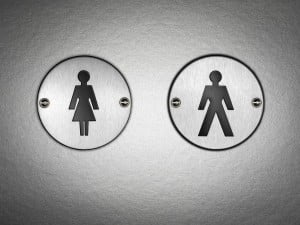Originally published at The Body Is Not an Apology and republished here with their permission.

A taller person has their arm on the shoulder of a younger, shorter person. Both have a serious expression.
No matter where you look in our country’s culture and our current events, male dominance can be—well—quite overbearing.
Patriarchy – which is a system that privileges men and masculinity as better than and more respected than women, non-binary people, and femininity – permeates nearly every aspect of our lives.
Although patriarchy is set up in a way to benefit men, it can also hurt men in many ways, as men are under the constant scrutiny of the fabricated norms that patriarchy has put in place.
What many men don’t like to admit, or maybe even don’t know, is that a lot of what feminism represents can directly affect the harm that patriarchal norms cause for men.
Below are seven ways that patriarchy actively (or passively) hurts men, and how feminism can actually help men move past patriarchal norms in order to achieve a level of self-love and self-actualization that isn’t hindered by unrealistic masculine expectations.
1. Reflectiveness
As we’ve talked about in other articles at TBINAA, there are certain aspects to the norms of masculinity that make men feel uncomfortable exploring certain parts of their own lives, minds, and personalities.
A troubling aspect of upholding the norms of masculinity is that men don’t often put effort into questioning or reflecting on such norms, let alone how their own actions affect others.
Rather than admitting faults or embracing vulnerability, men are told to “man up” or “stop being a p-ssy” in order to protect their precious masculinity, even if it means upholding harmful, destructive, and hate-filled norms that negatively affect those around them – and inevitably, themselves.
Feminism turns that idea of avoiding reflectiveness on its head.
What many feminists advocate for is all people, especially men, being more reflective and introspective, and being more comfortable with being called out for things that others may have an issue with.
A big part of feminism is understanding how one’s actions and beliefs affect others, which patriarchal masculinity systematically avoids by upholding a more individualistic and man-versus-world mentality.
This aspect of feminism, especially as it has evolved in recent years, can help men understand that keeping up a persona of ultra-masculinity or machismo is something that not only make others uncomfortable, but can directly hurt those they love or care about the most.
2. Competition
One of the most negative aspects of the patriarchal norms of masculinity is the tendency for men to be in constant competition with each other. Almost every aspect of many men’s lives is shrouded by the need to see themselves as better than other men, or other people in general.
This includes physically, such as working out for the specific intent of having bigger muscles, better abs, or more strength than other men, or intellectually, where men will feel the need to “mansplain” a topic to women, even if the women they’re talking to are more knowledgeable on the topic than they are.
So much of the actions men take and the way men think are related to the desire to be better than others.
It’s a much different story in the world of feminism. Despite the many stereotypes of women being highly competitive with each other, feminism has evolved around the notion of community and solidarity – and these are crucial to achieving self-love and self-care.
It is much more important for feminists to create a strong community of like-minded and caring individuals than it is to automatically push away or compete with others.
Feminists are much more interested in creating a space that feels safe and comfortable for as many people as possible.
This can be beneficial for many men who have trouble simply accepting others in their lives without feeling the need to be better than them – they can find a way to truly separate themselves from the competition that surrounds them every day.
3. Status Quo
It’s human nature for people to not like change.
We like to be comfortable in whatever situation we find ourselves in, and we don’t like it when something comes along and puts us out of that comfort zone. We will find a way to stay comfortable, often at any and all costs.
Unfortunately, this is exactly what patriarchy does for men.
It enables men to remain comfortable in their privileges and dominance while never having to question the issues women and non-binary people have to deal with in relation to their comfort.
For men, it’s easier to find partners who will do all of the things that men “aren’t supposed to do.” Although times have changed, many men still feel as though they are meant to be the main moneymakers in their household, while their partners should be the ones staying home, making them dinner, doing their laundry, taking care of their children, and so on.
Feminism seeks to get rid of those archaic notions of what it means to be a “real man” or a “real woman.” Feminists would rather dismantle those norms and create a society that doesn’t let gender dictate how people should or shouldn’t act.
What men don’t realize is that allowing themselves to fall into the trap of patriarchal masculinity is not only hurting the people they wish to be involved with in life, but it’s also hurting themselves by not allowing them to explore themselves and define themselves beyond the status quo of gender.
What many feminists would rather see is men working alongside them to break down those barriers and norms and embrace a life of self-actualization that is free of baseless categorizations and judgments.
4. Hierarchy
Similar to the notion of keeping up the status quo, men often don’t realize how our society is built to put them ahead of women and non-binary people.
The patriarchy has supported this notion that men are inherently better than others, simply by virtue of being a man. Even if you identify as a man, if you don’t play along with the norms of masculinity, you’re treated as an “other” as well.
More importantly, though, we see where men are put on a pedestal while others fall by the wayside. Typically, men are paid more, men are offered jobs more often, men pay less for products, men aren’t subjected to constant catcalling or sexual violence, and are content with this and so much more staying the same.
Unfortunately, women and non-binary folks usually don’t have those same options, and they’re forced to be uncomfortable, feel unsafe, or face violence on a daily basis.
The solution that feminism has developed for this is leveling the playing field. That doesn’t mean men should have to deal with the same disadvantages as other people. Rather, men should both understand what others go through on a daily basis and also work toward eradicating those issues on their end, since much of it is perpetuated by men in the first place.
Feminists strive first and foremost for equality, as well as healthy interpersonal relations.
While striving for equality and giving up power and hierarchy sounds scary for a lot men, it actually presents an opportunity for men to put their effort into creating a society where women and non-binary people don’t automatically fear men, especially cisgender men.
5. Ignorance
Although patriarchy benefits all men in one way or another, it doesn’t support all men in the same ways. This is one of the illusions that patriarchy tries to pull though: You’re a man, you’re better than women, and definitely better than non-binary people.
But what if you’re a black man as opposed to a white man? Or a poor man as opposed to a rich man? A trans man, a disabled man, an undocumented immigrant man, or an uneducated man as opposed to a cis man, an able-bodied man, a male citizen, or an educated man?
What the patriarchy wants men to believe is that these other factors of race, ability, class, and so on, don’t matter – that all men are equal – while it also supports the systems that oppress people who aren’t white, rich, able-bodied, cisgender, or any combination of traits that are considered the “norm.”
Feminism, especially more recently, is focused on looking at everyone’s experiences through a lens of intersectionality. This means that as opposed to just looking at someone as a man, they recognize that man as also being black, disabled, and poor, for example.
Intersectional feminism allows for a multi-faceted analysis of the various experiences, histories, and biases that affect a person.
While the focus of feminism is often primarily on gender, feminism with an emphasis on intersectionality can help men, women, and non-binary folks alike understand where they are most negatively affected, how they experience various forms of oppression, and what they can do to eradicate those oppressive systems.
6. Rape Culture
There is no logical or reasonable way to deny that we live in a society that perpetuates rape and rape culture.
Our society has been historically set up in a way that makes rape, sexual violence, or romantic manipulation not only possible, but a normal, expected occurrence for many people.
For men, it’s seen as a necessity to seduce women (or other potential sexual partners) to the point that they’re encouraged to force other people into sex, with little to no regard for consent.
When men are questioned about it, it often gets played of as “boys will be boys,” or “uncontrollable sexual urges,” or “nothing that serious.”
For the survivor, however, they are often treated horribly, with outsiders calling them “sluts,” saying “they deserved it” or they were “asking for it” for one reason or another, and inevitably removing responsibility from the man who committed the act in the first place.
And it goes beyond direct physical encounters too of course, with how women are objectified in every form of media, or how children and teenagers are sexualized to the point that they’re kicked out of class for clothing that’s deemed “too sexy,” so on and so forth.
A recent focus of feminism is completely ridding our society of rape and rape culture. Feminism is focused on changing the conversation of “no means no” to “yes means yes,” providing services for women and other folks – including men – who have been affected by rape or sexual violence, and looking at the very systems that exist to perpetuate the notion that rape is an expected and nearly acceptable occurrence.
Feminism is out to protect everyone from the terrifying outcomes of rape and rape culture by making sure it can not only be talked about more openly, but it can also be more openly disavowed and dismantled.
Ultimately, that means breaking the patterns that lead men to think that manipulating, hurting, or raping people is okay, and having men look at their actions and understand why people of marginalized genders just don’t trust men in many situations.
7. Toxicity
What all of this comes down to is the simple fact that the masculinity that patriarchy has bred and enabled is extremely toxic. It makes everything worse not only for those who are subjected to all of its negativity, hatred, subordination, and oppression, but it also makes things worse the men who benefit from it because they don’t have to question it.
Men are hurt by their own dedication to toxic, patriarchal masculinity by allowing themselves to hurt others.
While some men have definitely distanced themselves from the toxicity, most men are just fine staying in those positions – and they’ll defend it no matter what, because they’re comfortable and safe.
Even so, just distancing themselves from toxic masculinity isn’t enough. Men have to work to actually change their behaviors, and call out other men who are acting in toxic and horrible ways, who are acting in ways characterized by body terrorism.
This is one of the goals of feminism: to enable men to be less toxic and be more caring and supportive, to be willing to share and create safe spaces.
But feminism is also important for men to achieve a level of radical self-love that patriarchy doesn’t allow in any way.
Men have to be more willing to understand themselves, their feelings, their insecurities, their needs, while also actively rejecting the notion that being violent or abusive or overbearing or condescending is normal.
Men have to understand that you can’t separate gender from race, sexuality, ability, class, and other identities. Men have to be more feminist-minded when it comes to treating others with respect, calling out toxicity, fighting for social justice and equality, and with being good to themselves as well as those around them.
It is pertinent to the betterment of our society that we can question ourselves, masculinity, and patriarchy.
[do_widget id=’text-101′]
Philippe Leonard Fradet is a content writer for The Body Is Not an Apology, as well as a fat studies/sexuality studies researcher. You can check out his writings on his Tumblr.
Search our 3000+ articles!
Read our articles about:
Our online racial justice training
Used by hundreds of universities, non-profits, and businesses.
Click to learn more




















